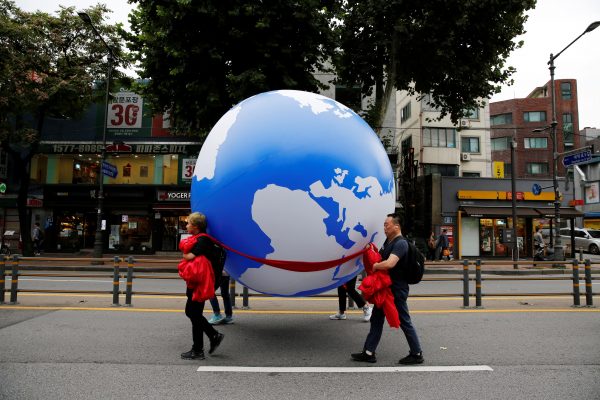South Korea’s Green New Deal is the most comprehensive and publicised of these efforts and is being both lauded as a new era of South Korean development and pilloried as repackaged business-as-usual. With South Korea’s green push evolving in real time, the evidence supports a more patient evaluation. What is already clear is that a converging national play for green technology leadership, international trends on coal divestment, and increasingly clamorous civil society voices mark an end to South Korea’s business-as-usual development.
The South Korean Green New Deal emerged in mid-July as part of a post-COVID-19 rebound strategy to create jobs and boost South Korea’s standing in growth industries. Green New Deal projects will receive 73.4 trillion won (US$62.5 billion) in public investment, with renewable energy (24.3 trillion won or US$20.7 billion), green infrastructure (12.1 trillion won or US$10.3 billion) and green industrial sectors (6.3 trillion won or US$5.4 billion) each large recipients.
South Korea will also continue its ambitious hydrogen play, where it hopes to disrupt a sector currently dominated by Europe and China. Substantial public investment in hydrogen refuelling stations accompanies efforts to become the global leader in hydrogen powered car production by 2030, and to power just under one million homes by 2040.
Much of this is not new. The Blue House’s own telling frames the Green New Deal as an extension of former president Lee Myung-bak’s Green Growth platform, which has influenced South Korea’s development strategy since 2008. The hydrogen push largely predates the Green New Deal, as do trends of scaling-up investment in renewable energy and green infrastructure.
Meanwhile the Green New Deal falls short of the campaign platform of the ruling Democratic Party to have net zero emissions by 2050, a carbon tax, and to end financing for coal power plants overseas. By some measurements, the entire package will reduce carbon emission by just under 13 million tons over the next five years, with a price tag of US$5000 a ton — a paltry environmental outcome with a hefty price tag.
But South Korea’s Green New Deal does not exist in isolation, and wider national environmental policy is evolving in response. A Democratic Party legislative proposal aims to ban public financing for overseas coal projects. The bill would prevent the Korea Electric Power Corporation, the Korea Development Bank, the Export-Import Bank of Korea (Korea EXIM) and the Korea Trade Insurance Corporation from participating in constructing or operating coal-fired power plants abroad, and from extending the life of existing plants.
Subnational entities are also stepping up to implement more progressive measures. A majority declared a climate emergency back in June 2020 and — more recently — 56 subnational entities announced that when selecting their depository, they will give preference to financial institutions that are divesting from coal.
Such pressures on the financial sector combine with expectations of a new regulatory environment and a push for investment in international energy that prioritises environmental and social governance (ESG) factors. Internationally, major institutional investors have already raised concerns about the country’s involvement in overseas coal investments as the sector experiences increasing capital flight. Domestically, the Korea Financial Services Commission launched a Green Finance Task Force in August to help the sector integrate climate-related risk into financial monitoring, promote investment in green industries and participate in global green finance networks. Later this year the Korea Exchange (KRX) is also expected to launch a carbon-efficiency green index.
Taken together, South Korea’s Green New Deal and these adjacencies have the potential to significantly alter the country’s environmental trajectory. South Korea’s past 12 years of green growth strategy have seen the launch and implementation of the first national carbon market in Asia and helped move it off an emissions track that was the highest in the OECD. Yet South Korea has so far failed to reign in its coal investment abroad, remaining the third largest overseas coal financier behind Japan and China, and made substantial compromises to powerful industries to retain political support. These compromises were practical and necessary — particularly for the conservative Lee government — and deserve to not be dismissed cynically.
But the political and social context in South Korea has changed. Civil society advocates have more liberal champions in government than ever before, along with an agenda that is dovetailing with international public and private momentum towards fossil fuel divestment, ESG and net-zero targets. As such the South Korea story is both unique and relevant for other parts of Asia and the world.
While its Northeast Asian contemporaries in Tokyo and Beijing face different political and socioeconomic realities, they confront similar pressures to move away from coal investment and commit to more ambitious climate targets. Major emerging economies such as Indonesia, Vietnam and Thailand likewise encounter new considerations and pressures about what type of investment they accept — and by extension what type of economy they build.
South Korea’s moves to double down on the environmental technologies and energy sources of the future may ultimately prove a harbinger for the wider region.
Jackson Ewing is a senior fellow at the Nicholas Institute for Environmental Policy Solutions and Adjunct Associate Professor at the Sanford School of Public Policy, Duke University.
Minyoung Shin is Asia Sustainable Finance Adviser at The Sunrise Project.

